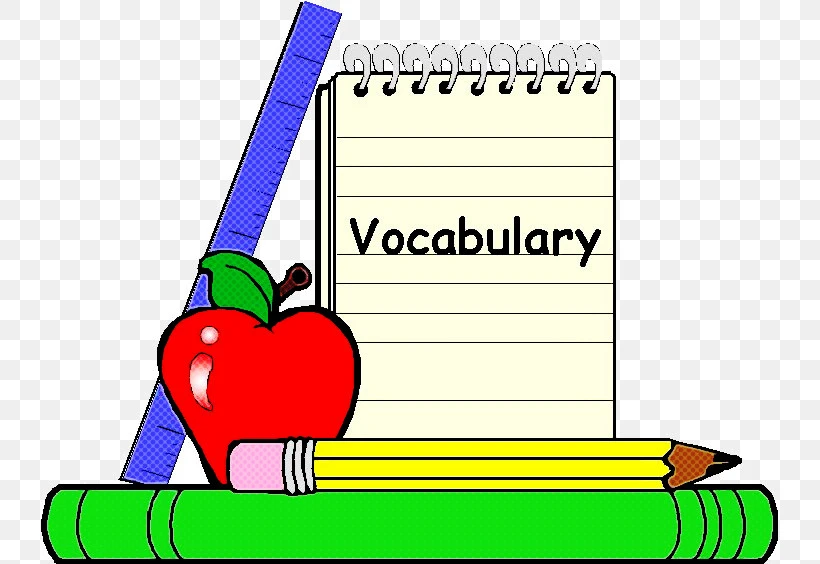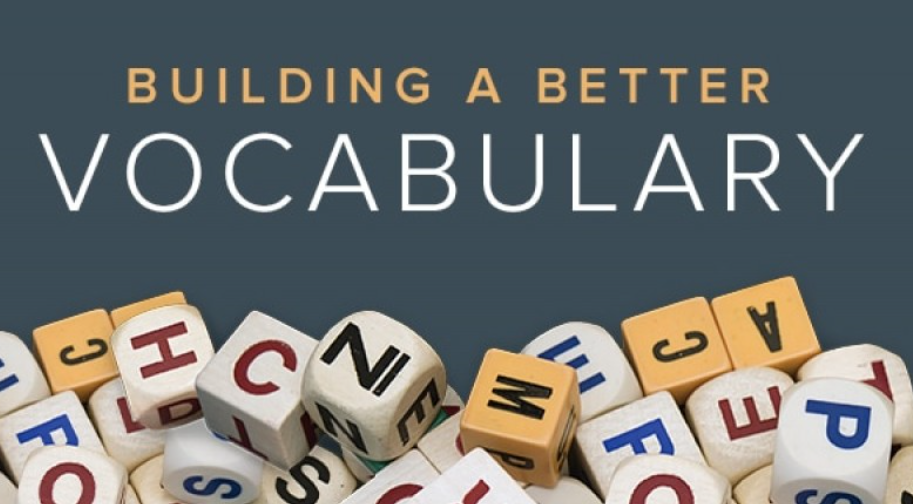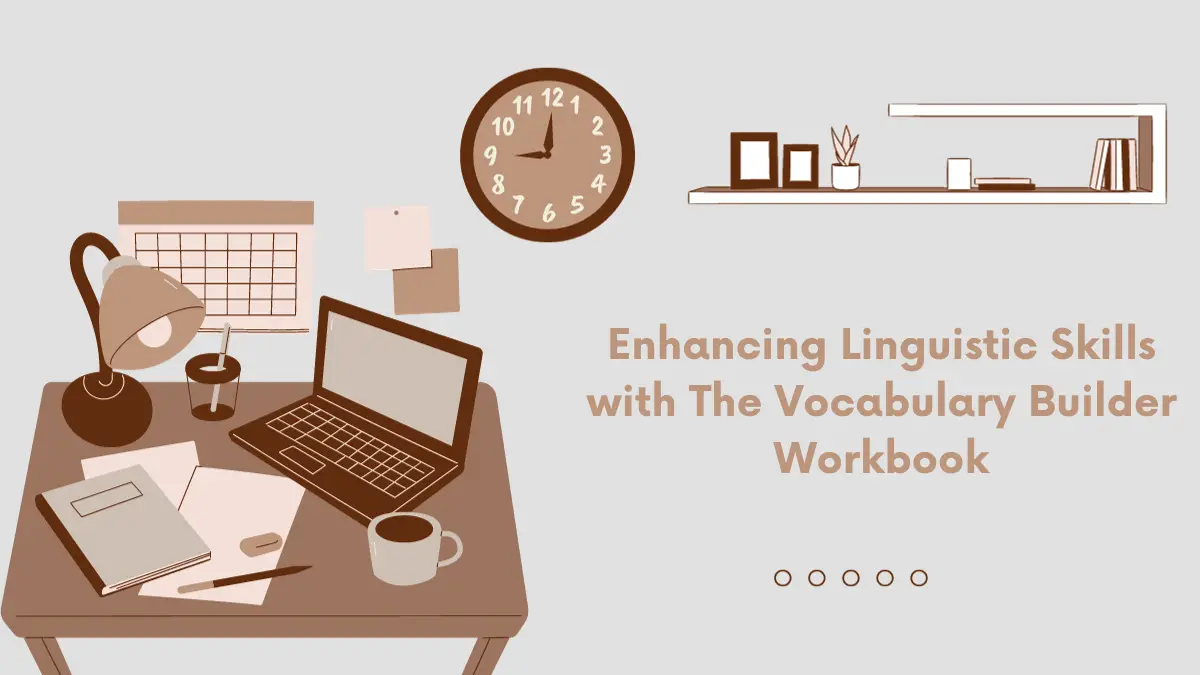Dive headfirst into the vast ocean of words with The Vocabulary Builder Workbook and emerge a linguistic Olympian. This isn’t some run-of-the-mill, dry-as-toast vocabulary manual! Nope, it’s your very own linguistic personal trainer, pushing you past your limits and turning you into a word-wielding warrior, ready to tackle any linguistic challenge thrown your way.
Say goodbye to dull flashcards and monotonous memorization. This workbook is filled to the brim with engaging lessons and retention-focused activities that’ll have you munching words for breakfast and spewing idioms by lunch. With Chris Lele, our seasoned test-prep expert at the helm, be ready to embark on an unforgettable journey of word mastery.
Prepare to be enlightened by lessons organized by theme and designed to titillate your linguistic senses. Ever wanted to know the roots of words, form associations, and recognize thousands more? We’ve got you covered. So strap in, hold on tight because this isn’t just about building your vocabulary, it’s about reinventing your relationship with words. Welcome to The Vocabulary Builder Workbook, your ultimate guide to word mastery!
An Overview of The Vocabulary Builder Workbook

The Vocabulary Builder Workbook transcends the traditional approach to vocabulary enhancement, offering a comprehensive, engaging, and effective pathway to word mastery. Instead of mundane rote memorization, it encourages an understanding of words in a broader context, making language learning both enjoyable and impactful. It demonstrates how words intertwine with each other, delving into their roots, and enabling you to form associations that lead to an enriched vocabulary beyond the 1,400 words explicitly covered in the workbook.
The workbook adopts a progressive approach to learning, steadily escalating the complexity of lessons. This ensures that you’re consistently challenged and allows for seamless adaptation to the increasing difficulty. The result is noticeable improvement and growth in your linguistic capabilities, making the workbook an invaluable resource not just for test-takers, but for anyone aspiring to enhance their reading, writing, and speaking abilities.
Retaining vocabulary is often a monumental challenge for learners. However, The Vocabulary Builder Workbook addresses this issue head on with exercises meticulously designed to aid long-term retention. The workbook is also organized thematically, further facilitating recall. The ultimate goal is not just to introduce new words, but to ensure these words become a permanent part of your vocabulary, thereby transforming your linguistic prowess.
Unpacking the Unique Approach to Vocabulary Building

At its core, The Vocabulary Builder Workbook is not just about learning new words; it’s about developing a profound relationship with language as a whole. It’s about unveiling the intricate web that connects words, discovering the shared roots that hint at similar meanings, and understanding the subtle nuances that differentiate one word from another. This workbook is a testament to the beauty of language, exhibiting how words evolve and adapt, just as we do, and establishing vocabulary building as a fascinating journey rather than a tedious chore.
One of the key factors that sets this workbook apart is its progressive approach. It’s judiciously designed to cater to learners at various stages, gradually intensifying the complexity of lessons to keep you consistently engaged and challenged. This method ensures that learners don’t feel overwhelmed with information, allowing for a seamless transition from simpler to more complex lessons. Whether you’re preparing for a standardized test or merely seeking to refine your language skills, this workbook facilitates continuous growth and improvement.
However, learning new words is only half the battle; ensuring their retention is the ultimate victory. The Vocabulary Builder Workbook excels in this aspect with its retention-focused activities. These exercises, coupled with the workbook’s thematic organization, are meticulously curated to optimize long-term recall and facilitate the integration of new words into your everyday vocabulary. Hence, the workbook not only enhances your vocabulary but also transforms your overall linguistic prowess, making you a more confident communicator.
The Role of Thematic Lessons in Vocabulary Enhancement

Thematic lessons play a crucial part in the unique approach adopted by The Vocabulary Builder Workbook. They have been strategically organized to foster a deeper understanding of words and their interrelations. These lessons center around a common theme or subject, grouping words that share similar definitions, associations, or roots. This arrangement facilitates the learning process by enabling learners to establish connections between new words and the ones they already know. Consequently, this leads to an enriched vocabulary and improved word recall, as learners can remember and retrieve words more efficiently when they’re associated with a particular theme.
Additionally, thematic lessons present an opportunity to explore the multifaceted nature of language and its inherent richness. When learners engage with words that share a common theme, they are not merely memorizing new vocabulary. Instead, they are delving into the cultural, historical, and etymological nuances that these words carry, gaining a deeper appreciation for the language and its evolution. This exploration not only makes the learning process more engaging and enjoyable but also reinforces the learners’ understanding of the language as a dynamic entity, constantly evolving and adapting.
Finally, thematic lessons in The Vocabulary Builder Workbook aid in the practical application of new vocabulary. By learning words within a specific context or theme, learners are more likely to use these words in relevant situations, making their communication more precise and nuanced. The emphasis is on helping learners move beyond passive vocabulary recognition to active vocabulary usage. In essence, the thematic approach in The Vocabulary Builder Workbook does more than just expand your vocabulary – it equips you with the tools to express yourself more clearly, accurately, and compellingly, enhancing your overall communication skills.
Progressing Through Levels of Difficulty in Vocabulary Lessons

The Vocabulary Builder Workbook takes a meticulous approach to the progression of its lessons, with each level introducing more complex vocabulary and concepts. This structure allows for a smooth learning curve, accommodating beginners while still providing ample challenge for advanced learners. The workbook starts with basic words and word structures, gradually introducing more complex vocabulary as the learner progresses. This approach alleviates the risk of learners feeling overwhelmed and ensures that each new word or concept is built upon the foundational knowledge already established.
In the initial stages, the focus is on familiarization with new words, their meanings, and their usage in context. As learners move to the intermediate levels, the workbook introduces more complex words, often with multiple meanings or nuances. The lessons start delving into the etymological roots of words, aiding in the understanding of how words are connected. At this point, learners are also introduced to more complex sentence structures, which help them gain confidence in using the new vocabulary in context.
In the advanced stages, The Vocabulary Builder Workbook introduces highly complex words often encountered in academic and professional settings. These lessons also delve into the subtleties of language, such as connotations and denotations, idiomatic expressions, and the usage of words in various contexts. The workbook maintains a balance between learning and retention throughout, incorporating review exercises at regular intervals to reinforce the vocabulary learned. This approach ensures that learners are equipped with a robust vocabulary and the ability to use it effectively in their day-to-day communication.
May Help You:
Unlocking the Power of English with ‘Perfect English Grammar: The Indispensable Guide to Excellent Writing and Speaking’
Comprehensive Guide to Mastering English Grammar
Importance of Retention-Focused Activities in Learning New Words

Retention-focused activities are a salient feature of the Vocabulary Builder Workbook, significantly enhancing its effectiveness as a learning tool. These activities are designed to reinforce the newly acquired vocabulary, ensuring that learners can not only recognize and understand these words but also recall and use them in context. Rather than rote memorization, these activities promote active recall, a scientifically proven method to enhance memory. This method involves actively stimulating memory during the learning process, strengthening neural connections and facilitating long-term retention.
The workbook’s retention-focused activities come in various formats, including quizzes, fill-in-the-blanks, matching exercises, and sentence completion tasks. These activities provide immediate feedback, allowing learners to gauge their understanding, identify any gaps in their knowledge, and rectify their mistakes promptly. This instant feedback loop ensures ongoing improvement and aids in consolidating the vocabulary learned. Furthermore, repeating these activities at different intervals – a practice known as spaced repetition – can significantly enhance memory and recall.
In summary, the Vocabulary Builder Workbook emphasizes retention as much as learning. Its array of retention-focused activities ensures that learners not only expand their vocabulary but also reinforce their new knowledge, ensuring that these words become a permanent part of their linguistic arsenal. This approach promotes active learning and long-term retention, equipping learners with a robust vocabulary that they can confidently use in their communication.
Chris Lele’s Expertise in Test-Preparation and Vocabulary Building

Chris Lele, the author of The Vocabulary Builder Workbook, possesses a wealth of experience in test-preparation and vocabulary building, making him an authority in the field. With over a decade of tutoring experience under his belt, he has a deep understanding of the challenges learners face when trying to improve their vocabulary. His extensive knowledge and understanding of language acquisition have directly informed the strategies and techniques used in the workbook, ensuring that they are effective and aligned with the learners’ needs.
Lele’s expertise particularly shines through in the book’s systematic and comprehensive approach. The workbook is designed to cater to learners at all stages of their vocabulary-building journey, from beginners to advanced learners. Each section is carefully crafted, with the difficulty level gradually increasing to help learners progress at their own pace. The exercises and activities included in the workbook reflect Lele’s understanding of how learners acquire and retain new vocabulary, focusing on active recall and contextual learning to ensure long-term retention and practical application.
Moreover, Lele’s experience in test-preparation has proven invaluable in shaping the workbook. His understanding of the vocabulary requirements for various standardized tests such as GRE, SAT, and ACT, informs the selection of words included in the workbook, making it an effective preparation tool for learners planning to take these tests. Above all, Lele’s passion for language and education is evident throughout the workbook, making The Vocabulary Builder Workbook not just an effective learning tool, but also a testament to Lele’s commitment to helping learners enhance their vocabulary and, by extension, their communication skills.
Exploring Roots of Words and Forming Associations

The Vocabulary Builder Workbook leverages the exploration of word roots as an effective strategy for vocabulary enhancement. Many words in the English language are derived from Latin and Greek roots. Recognizing these roots can help learners decode the meaning of unfamiliar words and improve their understanding of the language’s structure. For example, understanding that the Latin root ‘scrib’ or ‘script’ means ‘to write’ can help learners deduce that words such as ‘transcribe,’ ‘manuscript,’ and ‘inscribe’ are all related to writing. This exploration of word roots is particularly beneficial for intermediate and advanced learners, aiding in the decoding of more complex vocabulary.
The workbook also encourages learners to form associations between words, which is a powerful technique for memory reinforcement. For example, associating words with images, experiences, or emotions can create a more vivid memory, making the word easier to recall. Similarly, grouping words with similar meanings, or creating word maps, can help learners understand the relationships and nuances among words. This approach also helps with the application of the words in context, as learners can draw on these associations when constructing sentences.
Furthermore, the workbook highlights the importance of understanding the different contexts in which words can be used. This contextual understanding is crucial for practical application of the vocabulary. For instance, the use of words in formal, informal, academic, or professional contexts can differ, and understanding these differences can significantly enhance a learner’s communication skills. Overall, the Vocabulary Builder Workbook takes a comprehensive approach, marrying learning with retention strategies to ensure that learners can effectively use their expanded vocabulary in real-life scenarios.
Beyond the Workbook: Recognizing Thousands of Additional Words

The Vocabulary Builder Workbook goes beyond the traditional scope, aiming to equip learners with the skills to recognize and understand thousands of additional words that are not explicitly covered in the workbook. This transformative approach is based on the understanding that language learning is dynamic and evolving, and that effective vocabulary building involves not just rote memorization of words, but also the ability to decode, recognize, and understand unfamiliar words.
To achieve this, the workbook focuses on teaching learners the principles and techniques of word recognition and decoding, including understanding word roots, prefixes, and suffixes. Instead of learning individual words in isolation, learners are taught to break down complex words into their constituent parts, understand their meanings, and then reconstruct the word’s overall meaning. This technique is particularly useful when encountering complex scientific or technical terms, many of which are derived from Latin or Greek roots. Once the learners understand the basic building blocks of words, they can recognize and understand thousands of words beyond those specifically included in the workbook.
Moreover, the workbook’s approach encourages learners to take an active role in their vocabulary building journey. By focusing on principles and techniques instead of individual words, learners become active participants in their learning, continually decoding and recognizing new words as they encounter them. This active approach fosters a sense of curiosity and a love for learning, which are crucial for sustained, long-term vocabulary building. By the end of the workbook, learners are not just equipped with a larger vocabulary, but also with the skills and mindset to continue expanding their vocabulary beyond the workbook.
Reinventing Your Relationship with Words through The Vocabulary Builder Workbook

The Vocabulary Builder Workbook is more than just a tool for learning new words; it’s a way to reframe your relationship with language itself. By focusing not just on rote memorization, but on active engagement with words and their structures, the workbook enables learners to approach language as a dynamic and evolving entity. The heightened understanding of word roots, prefixes, and suffixes instills an ability to dissect and understand unfamiliar terms, a skill that remains useful long after the pages of the workbook are completed. This approach to learning sets the stage for an ongoing, lifelong relationship with vocabulary enhancement, fostering not just a larger lexicon, but an enduring curiosity and a love for language.
Lele’s commitment to active learning is apparent in the workbook’s design, with its focus on exercises and activities that encourage learning through doing. The integration of word maps, word associations, and contextual understanding allows learners to move beyond simply knowing words, to understanding their nuances, contexts, and applications. This hands-on, immersive approach to vocabulary building ensures that words are not just memorized, but deeply understood and readily applied in real-life scenarios, thereby enhancing effective communication.
Lastly, the Vocabulary Builder Workbook serves as a launchpad for learners. While it provides a rich reservoir of vocabulary and learning techniques, its true value lies in the empowering principles it imparts. By teaching learners to decipher word structures and understand their meanings, it equips them with the skills to recognize and understand thousands of additional words that are not specifically covered in the workbook. This ability to independently decode and understand new words cultivates a sense of self-directed learning and fosters long-term vocabulary expansion, making the Vocabulary Builder Workbook a transformative tool in language learning.


